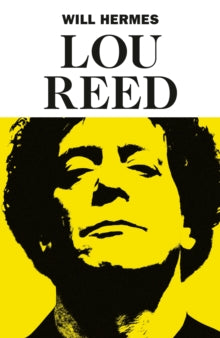
Lou Reed : The King of New York by Will Hermes
'The only Lou Reed bio you need to read' The Washington PostOne of Pitchfork's ten best music books of 2023 | A Kirkus Reviews best nonfiction book of 2023'A monumental work filled with first-person accounts of the master's life and a dizzying array of never-before heard details' Michael Imperioli, author of The Perfume Burned His Eyes The most complete and penetrating biography of the rock master, whose stature grows every year. Since his death ten years ago, Lou Reed's living presence has only grown. The great rock-poet presided over the marriage of Brill Building pop and the European avant-garde, and left American culture transfigured.
In Lou Reed: The King of New York, Will Hermes offers the definitive narrative of Reed's life and legacy, dramatizing his long, brilliant, and contentious dialogue with fans, critics, fellow artists, and assorted habitués of the demimonde. We witness Reed's complex partnerships with David Bowie, Andy Warhol, John Cale, and Laurie Anderson; track the deadpan wit, street-smart edge, and poetic flights that defined his craft as a singer and songwriter with the Velvet Underground and beyond; and explore the artistic ambition and gift for self-sabotage he took from his mentor Delmore Schwartz. As Hermes follows Reed from Lower East Side cold-water flats to the landmark status he later achieved, he also tells the story of New York City as a cultural capital.
The first biographer to draw on the New York Public Library's much-publicized Reed archive, Hermes employs the library collections, the release of previously unheard recordings, and a wealth of recent interviews to give us a new Lou Reed-a pioneer in living and writing about nonbinary sexuality and gender identity, a committed artist who pursued beauty and noise with equal fervor, and a turbulent and sometimes truculent man whose emotional imprint endures.
In Lou Reed: The King of New York, Will Hermes offers the definitive narrative of Reed's life and legacy, dramatizing his long, brilliant, and contentious dialogue with fans, critics, fellow artists, and assorted habitués of the demimonde. We witness Reed's complex partnerships with David Bowie, Andy Warhol, John Cale, and Laurie Anderson; track the deadpan wit, street-smart edge, and poetic flights that defined his craft as a singer and songwriter with the Velvet Underground and beyond; and explore the artistic ambition and gift for self-sabotage he took from his mentor Delmore Schwartz. As Hermes follows Reed from Lower East Side cold-water flats to the landmark status he later achieved, he also tells the story of New York City as a cultural capital.
The first biographer to draw on the New York Public Library's much-publicized Reed archive, Hermes employs the library collections, the release of previously unheard recordings, and a wealth of recent interviews to give us a new Lou Reed-a pioneer in living and writing about nonbinary sexuality and gender identity, a committed artist who pursued beauty and noise with equal fervor, and a turbulent and sometimes truculent man whose emotional imprint endures.
